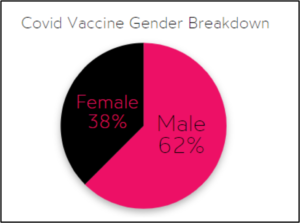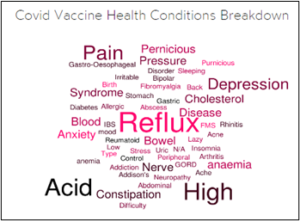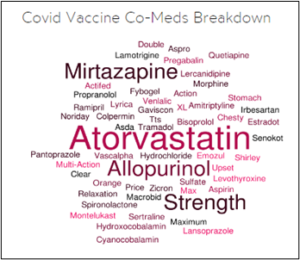In the race against new super spreading virus variants, the UK among other countries have implemented a fast streamed vaccine programme to protect the vulnerable as quickly as possible. Since the beginning of January, 17,916,181 people in the UK have been given their first dose of a COVID-19 vaccine, accounting for around 26% of the population.2,3
As a company with close interaction to patients, we know more than anyone the burden and effect COVID-19 is having on patient populations. Over the course of the pandemic, Talking Medicines have been doing all we can to support our Medsmart® community while sharing data insight that we hope will positively influence patient experience going forwards.
With mass immunisation moving so quickly we were interested in seeing how the results of some of our Medsmart® App features lined up with these government figures.
COVID-19 Tracker
In May 2020 we added the COVID-19 tracker into Medsmart®. This feature was added to allow patients to document their COVID status – whether they suspect that they have COVID, they have had their diagnosis confirmed by a test or are indeed uninfected.
Over the course of the last few months, we have seen steady use of this feature by our Medsmart® community, with an increased number of users confirming their COVID status every week.
COVID-19 Vaccine tracker
At the end of last year, we added an additional feature – our COVID-19 vaccine tracker. This has a similar principle to the COVID-19 tracker, however this version records whether or not Medsmart® users have been vaccinated.
The majority of those using our feature were in the age group of 60-75 years old, with 62% of total participants being male.

We have also been looking at what health conditions users of this feature have. From this analysis we see that the most common conditions are acid reflux, depression, anxiety, high blood pressure and high cholesterol.

Unsurprisingly, many of the medicines being taken match to the common health conditions. We are seeing a high use of Atorvastatin (High cholesterol medicine), Mirtazapine (Depression medicine) and Allopurinol (Gout and Kidney stone medicine).

We believe that the data we collect about coronavirus, patients and vaccines can be used for good. It is important to us that we use our tools not only to connect patients with the wider healthcare system but also to connect the healthcare system back to the patients and their voices. We hope that by continuing to collate and structure data from our COVID-19 trackers, we can continue to contribute to the COVID-19 effort as we continue to strive for a route back to normality.
References:
- Man using analytics software on his mac (https://unsplash.com/photos/pypeCEaJeZY)
- https://www.bbc.com/news/health-55274833
- https://coronavirus.data.gov.uk/details/vaccinations




